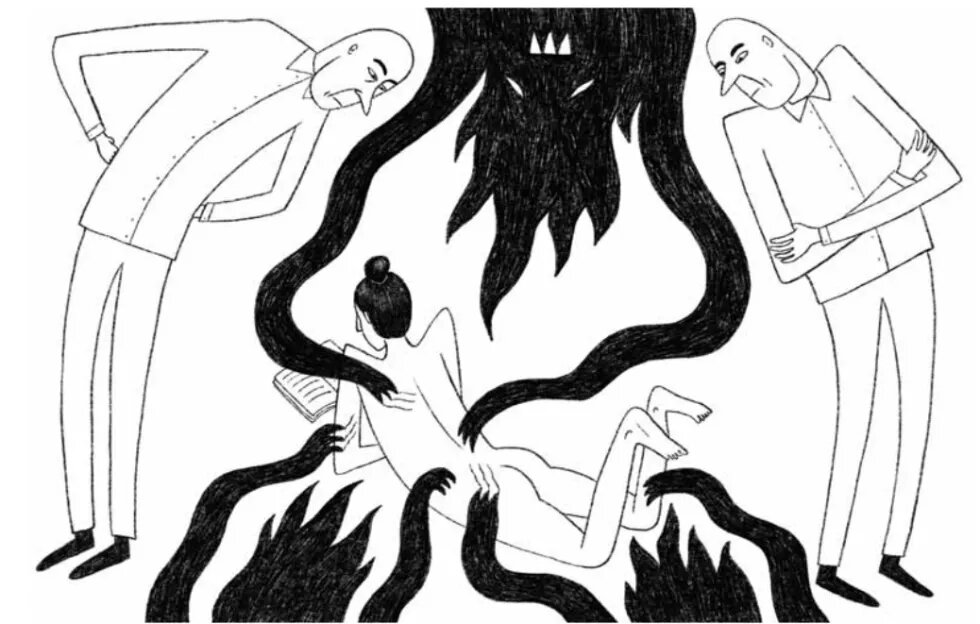The current clashes over values are reflected even in works of Czech literature and capture the imagination of both living classics and the incoming generation of writers. Although ideological arguments primarily follow the liberal-conservative dividing line, the realm of literature also is familiar, especially inside the liberal opinion camp, with an inwardly oriented critique, or exaggerated narratives with highly ambivalent meanings.

Urban hipsters leave Europe to build a new civilization among the ruins of a war-torn Syria. Radical feminist women establish a totalitarian state. Prague turns into a subtropical region threatened by destructive flooding as a result of climate change. A Muslim invasion of the Czech Republic is fended off by a revival of medieval values and Slavic mutuality. A superhero hunts down her sexual predator… That, too, is what culture wars can look like when translated into the works of fiction by Czech authors, who, in the 1990s at the latest, understood the meaning, attractivity, and creative potential of these types of conflicts.
No wonder: through the theme of culture wars – understood as a transformation of politics in which traditional socio-economic issues are suppressed in favour of cultural and symbolic phenomena – art places itself in close proximity to key social problems, whether approached from the conservative or the liberal perspective. Culture wars enter the sphere of art primarily in two ways. The first is constituted by the need to review the history of art in the context of the current cultural conflicts; the second has to do with artistic reflection of the conflicts as such, where stances are often being assumed in attempts to influence the functioning of the given artistic field as a whole.
The Canon Wars and the Award Wars
An abundance of examples of the above-mentioned, often closely intertwined phenomena can be found in the United States. There, revisionism is apparent mainly in various “canon wars”, in which conservatives defend the traditional canonical artists and artworks as specimens of pure art, while the opposing party points out the long-term marginalization of some groups of artists and their works – African Americans, women, or queer authors, for instance. Practically speaking, such academic debates, ranging from literature through film to music theory, have the strongest impact on education, which becomes a wrestling arena for the rivaling parties to demonstrate their actual power. Conservative academics complain about Shakespeare disappearing from the curricula, being replaced by ethnic or sexual minorities, while from the liberal perspective, the point is to provide space to previously silenced voices in order to widen the scope of interest, not necessarily to attack classical authors.
Culture wars, however, have also found their way into works of fiction reflecting upon the social situation and assuming a stance on it. The immense popularity of journalist and author Tom Wolfe’s novel The Bonfire of the Vanities (1987), for instance, is based on his merciless depiction of America plagued by cultural clashes where no one is spared: from hypocritical white millionaires, through cowardly businessmen, to seemingly progressive politicians who take advantage of the minorities for their own profit, or liberal media who readily adopt attractive narratives without being interested in the real picture.
Another source of increasing controversy in the art world are various awards and grants, which, according to some, tend to favour one side of culture wars, regardless of artistic value. For modern liberals, on the other hand, identity and social attitude are inseparable from the value of art, as was evident in the heavily publicized search for suitable translators of the poetry collection The Hill We Climb (2021) by the African American author Amanda Gorman. Various award committees, whether local or Nobel ones, face accusations of favouring either side of the cultural conflict. When Michel Houellebecq narrowly missed out on the prestigious Prix Goncourt in 1998, suspicion had it that rather than the artistic quality of his texts, the problem lay in the worldview of their author, famous for criticizing the consequences of the spreading of liberal values. Similarly, when Philip Roth did not receive the Nobel Prize, some critics held it was because in The Human Stain (2000), he criticized political correctness at universities.
Harassment from the West
But can such impacts of culture wars on the literary sphere be spoken of in the Czech context as well? Let’s take a closer look at Czech literature and the way culture wars have, especially in the new millennium, become not only a frequent literary theme, but also a perspective of sorts; a lens through which literature is viewed.
The first work of literature in Czech which extensively reflects upon culture wars might be Josef Škvorecký’s The Engineer of Human Souls (1977). In this exile novel, Škvorecký adeptly contrasts the theme of the resistance of Canadian liberal leftist intellectuals and the media to systemic racism and prejudice against the queer community with problems that trouble citizens of the communist Czechoslovakia. This comparison makes Western intellectuals look like naïve, spoilt dreamers preoccupied with pseudo-problems. From the perspective of the Czech emigrant experience of the Cold War, cultural conflicts remain utterly incomprehensible, while Canadian society, in turn, is unable to empathize with the suffering behind the Iron Curtain.
In a way, The Engineer of Human Souls predicted the attitude Czech society would assume towards the Western culture wars after the revolution in 1989. The emphasis on overlooked forms of oppression does not fit into the historical narrative about the ultimate victory over the Communist Party, while also questioning the exceptionality of the Czech experience that was supposed to become our contribution to the West. From this reflection on the mutual incomprehension, Škvorecký gradually moved to open criticism of some Western liberal attitudes.
In the early 1990s, his essays for the influential weekly magazine Reflex thus played an important part in the formation of Czech society’s negative attitude towards feminism and political correctness. In these texts, he reacted to legal and linguistic changes concerning sexual violence against women in America, and suggested a number of parodic translations for the contemporary Anglo-American discourse concerning sexual harassment. His translation of “harassment” using the light-hearted expression “harašení”, which in Czech strongly connotates funny foolishness and madness, earned particular success with the Czechs, less so his translation of “date rape” as “znásilnění na dostaveníčku”, where the word “dostaveníčko” implies, instead of a generic “date”, an arranged sexual intercourse, thus making the whole expression paradoxical. In any case, his neologisms did contribute to the long-standing culture of downplaying the issue of violence against women.
Beyond the Horizon of Dissent
In the 1990s, Czech literature and literary debates were preoccupied with issues completely different from discrimination of minorities. The talk of the time was postmodernism and literary “authenticity” versus free, unrestrained, autonomous writing independent of the society. Another resonant subject was coming to terms with the past, for example through discussions about the activities of writers, critics, and academics inside the pre-revolution official structures. It was only after 2000 that the situation gradually developed due to a partial generational replacement, as well as a general shift in the social climate. Sensitivity towards the traditional issues of culture wars, such as gender, queer identity, or migration (in the context of what came to be called “refugee crisis”), has been slowly increasing. This transformation, set in motion mostly by the liberal opinion camp, provokes a defense of both conservative values and the relevance of the old dissident aesthetics and ethics.
A good example of the conflicts between a new feminist sensitivity, conservativism, and the ethos of dissent is the debate surrounding Jáchym Topol’s 2017 novel A Sensitive Person. In his book, Topol, a living classic of Czech literature, rooted in the pre-revolution underground culture, is coming to terms with the state of Czech society, mocks the president of the country, Miloš Zeman, and further develops his favourite motif of an incomprehensible, oriental Russia. The novel, as well as a related interview with the author, was criticized by the former president Václav Klaus and his advisors, who saw Topol’s statements as “scorn for ordinary people”, typical of liberal elites, i.e. the Prague Café Society (a derisive expression for the urban liberal intellectuals, popular with the conservative camp).
At the same time, however, the writer earned disapproval on the other side of the barricade as well. Feminism might well be considered a blind spot of Czech dissent, and it was precisely from this spot that literary critic Eva Klíčová criticized Topol’s novel in the prominent literary journal Host. She wrote of a “bitterness” in established Czech writers of Topol’s generation and the “90s’ liberals” in general, springing from their disappointment with the post-revolution developments and the fact that in hindsight, their conception of freedom seems illusory and endangered by the requirements and perspectives of both minorities and sidelined majorities. That is why Klíčová characterized Topol as one of the “storm troopers” fighting for “true masculinity”, who, in his novel, celebrates individual freedom through the aggressive topoi of the feminist uberdyke versus the natural female sexual sensuality and fertility. According to Klíčová, therefore, “the former messenger of freedom […] has, ironically, naturally transformed into a defender of a post-totalitarian degree of freedom, one that only reaches up to a point, and is only for some – in order not to interfere with “archetypal fantasies of middle-aged men”.
Václav Klaus’s and Eva Klíčová’s reactions to Topol’s novel show that in the 2010s, dualities such as dissent versus communism, or authenticity versus postmodernism, are losing their social reverberation, being replaced by the conflict between liberal and conservative values, largely matching the Western model. Authors of the incoming generation often no longer feel bound by requirements of artistic authenticity or postmodern playfulness, and accept the idea that what we need is socially conscious art, regardless of critical voices that liken this new literary sensitivity to the demand for “socially engaged” (i. e. pro-regime) art under the communist dictatorship. Attempts are also made, although to a lesser extent, to revise the literary canon with respect to gender and racial prejudices, especially in texts for children and youth. The most notorious cases include the criticism of the representation of Roma people in Josef Lada’s Mikeš, an illustrated series about the adventures of Mikeš the tomcat, and complaints about the gender-imbalanced poems in the iconic spelling book by poet Jiří Žáček. The conservative counterpoint of these controversies was, for instance, the condemnation of the sexually open children’s book Co to tam mám? (“What Do I Have Down There?”) by Camille Laurans (Czech edition 2016), which earned criticism from far-right MP Tomio Okamura.
In the 1990s, topics such as migration, climate change, and sexual abuse become legitimate and relatively frequent subjects of literary works. This gradual shift in artistic sensitivity can be seen in the works of Marek Šindelka. His early poem collections and fictions were critically acclaimed chiefly for their formal aspect, but his 2016 novel Únava materiálu (“Material Fatigue”, in Czech 2016) already manifested a strong social attitude, reflecting on immigrant life stories, and above all the dehumanization of refugees from the Middle East by a part of the domestic media and political scene. The revised edition of his fiction debut Aberrant (in English 2017, revised Czech version 2019), then, emphasized the novel’s environmental appeal. Fictions such as Josef Pánek’s Láska v době globálních klimatických změn (“Love in the Time of Global Climate Change”, Czech edition 2017), Michal Kašpárek’s Hry bez hranic (“Games Without Borders”, Czech edition 2018), and Jaroslav Formánek’s Morituri (2017) engage with the privileges that follow from the Czech Republic’s affiliation to the West, as well as with the responsibility, which cannot be relativized by the specific experience of communist dictatorship. Pavel Bareš’s novel Meta (2020), straddling the border between high and popular literature, openly reflects on the debate about the social role of literature, while focusing on the sensitive issue of stalking and tolerance towards sexual violence.
Challenging One’s Own Audience
The Czech literary establishment is often criticized by the conservative camp for its mostly liberal orientation, whether it takes the form of the dissident “freedom from”, or a progressivist social involvement. Despite this perceived liberal dominance, however, there are authors, as well as literary realms, claiming allegiance to conservativism, defending it in one way or another, or else criticizing liberal values. Authors such as Miloš Urban and Petr Stančík often populate their works with characters who caricature contemporary urban liberals by fashioning them as fanatical eco-terrorists or frustrated female students of the humanities – for example in Stančík’s Nulorožec (“Zeroceros”, Czech edition 2018), or Urban’s Závěrka (“Final Accounts”, Czech edition 2017).
A more sophisticated and complex approach to culture wars can be found in the work of David Zábranský, who likes to toe the thin borderline between provocative critique of liberalism and endorsement of sexual, racial, and other stereotypes. In his drama Herec a truhlář Majer mluví o stavu své domoviny (“Actor and Joiner Majer Speaks About the State of His Homeland”, in Czech 2016), Zábranský raises the issue of Czech society divided by culture wars. The critique of liberals, in this case, targets primarily the audience of the play themselves – the “Prague Café Society” – characterized by their sense of superiority over “the mob”, their opposition to president Zeman, and their condemnation of “unacceptable” popular attitudes towards refugees and Roma citizens. This critique of cultural elites on an intellectual theatre stage had a provocative, alienating effect, appreciated by exactly the audience it targeted. Zábranský’s novel Za Alpami (“Beyond the Alps”, Czech edition 2017), took the reflection of national and sexual stereotypes so far that it was called, in a review by Jan Čulík, “the first openly fascist Czech novel, bound to fill you with filth and shame”. The theme of society torn in two by culture wars was revisited by Zábranský in the novel Logoz aneb Robert Holm, marketer dánský (“Logoz, or Robert Holm, the Danish Marketer”, Czech edition 2019), in which the idea of social division is driven to its extremes.
A similar strategy is, to an extent, present in some of the novels by the critically highly regarded Petra Hůlová. First, her Strážci občanského dobra (“Guardians of the Civil Good”, Czech edition 2010) presented its mostly anti-communist readership with a story of the post-revolution development through the eyes of a woman with firm communist beliefs, and later, Hůlová followed a similar tactic in Stručné dějiny hnutí (The Movement, Czech edition 2018, English translation 2021). This dystopian novel explores a totalitarian society based on the theses of radical feminism driven to the point of absurdity. It was mainly due to the discrepancy between the author’s liberal opinions and the cautionary tone of the story, caricaturing the emancipation rhetoric, that the book stirred great interest.
Back to the Middle Ages
Zábranský’s criticism of liberal intellectuals and their haughty attitude towards the rest of society or Hůlová’s subversive texts are, however, hardly the only modes of literary reaction to culture wars. For truly conservative and anti-liberal works, one must venture into the sphere of popular literature.
Author Vlastimil Vondruška, despite his long-standing popularity with readers, mostly stands apart from literary critics’ attention, and his easily digestible historical detective stories, at least at first glance, do not constitute the frontline barricade of culture wars. This escapism, however, by no means characterizes Vondruška’s essays, regularly issued in various daily newspapers, on the Parlamentní listy online news portal, and consequently in printed collections such as Breviář pozitivní anarchie (“A Breviary of Positive Anarchy”, Czech edition 2016), and O svobodě myšlení (“On the Freedom of Thought”, Czech edition 2021). Vondruška’s essays focus on current and attractive topics of culture wars, which the author interprets by means of historical parallels. These mostly serve to condemn liberal values and defend conservative attitudes, rooted in the idea of nation as a closed entity, and traditional family as a natural social unit. Other frequent targets of criticism include the consequences of globalization, multiculturalism, climate alarmism, the immigration politics of the European Union, and political correctness.
Vondruška’s essays have their fictional analogue in the author’s dystopian memoir novel Kronika zániku Evropy: 1984-2054 (“The Chronicle of the Downfall of Europe: 1984-2054”, Czech edition 2019), in which Europe is saved from a Muslim invasion caused by naïve, liberal European elites by returning to traditional values and feudal social organization. The novel can be read as a detailed catalogue of the key subjects of culture wars, as understood from the conservative point of view. Vondruška was able to weave into his novel almost all of the issues dividing contemporary society.
He thematizes gender roles, academic freedoms, the liberal press, immigration, Islam, Václav Havel, Miloš Zeman, MeToo, George Soros, sexual harassment, LGBT, elite art criticism, politically involved art, Brussels, feminism, post-colonial studies, Russian foreign politics, the political regimes in Hungary and Poland, the online newspaper Parlamentní listy, the president’s spokesman Jiří Ovčáček, etc. Some of his characters advocate for universal human rights, teach gender studies at Italian universities, help refugees, or support the EU, while the “rational” heroes warn, in vain, against Muslim immigrants, defend traditional family values, and believe in the advantages of the nation state. In the end, history proves the conservative heroes right, and, with the help of Russia, they manage to save Europe and traditional European values from the Muslim raids.
Considerable popularity is also enjoyed by novels and short stories of the action fantasy genre, whose authors draw inspiration from the exaggerated aesthetics of 1980s action movies, while at the same time reproducing all kinds of cultural and sexual stereotypes related to the invincible hyper-masculine white heroes and their no less perfect female counterparts. The popularity of authors such as Jiří Kulhánek, Štěpán Kopřiva, and František Kotleta is linked as much to their politically incorrect humor, and trespassing of social norms, as it is to their suspenseful action stories. Kulhánek’s founding novel Cesta krve (“The Blood Path”, Czech edition 1996) built a part of its attractiveness upon ridiculing environmental activists, who, in the story, establish a new totalitarian regime. The tough guys populating novels such as this one typically mock naïve activism or attempts to integrate Roma children, while saving the world from malevolent vampires. Kotleta in particular uses often derisive stereotypical images of different nationalities as a shorthand depiction of his characters.
Since the late 1990s, a fandom has been formed around action fantasy authors, expecting and appreciating the seemingly bold overstepping of dominant liberal norms. The younger generation, on the other hand, criticizes these authors for exploiting sexism and potentially racist prejudices, which sets them in a stark conflict with the contemporary, successful Anglo-American fantasy literature, focused on rejecting stereotypes rather than reasserting them.
The Return of Social Relevance
This text did not aspire to provide an exhaustive overview of Czech literature and literary criticism in their places of intersection with culture wars. Rather, I tried to outline several long-standing trends which have shaped the domestic literary terrain. These show that the dividing conservative-liberal axis of culture wars is gradually replacing the formerly dominant model, rooted in the ethos of dissent and the defeat of the communist regime, and upholding the idea of a liberated literature unbound by social demand. It was, however, precisely this divorce of literature and society that – with the benefit of hindsight – led to a dramatic decline in the social importance of literature, which became just one of many market commodities.
Unlike the requirement of social involvement, associated by today’s readers, despite the avant-garde tradition, mainly with socialist realist novels, culture wars constitute an attractive subject linked to powerful symbols, national and gender identities, global issues, and local traditions. Thus culture wars give both conservative and liberal authors not only a chance to restore the social relevance of literature through a resonant topic, but also considerable space for imagination. That is why today’s cultural battles are waged both on the pages of heavily intellectual works of prose and in trashy novels about demons and vampires.
Although the realm of what we call highbrow literature is considerably open to liberal values, the idea of a unified “Prague Café Society”, in the context of Zábranský’s, Hůlová’s, or Stančík’s work, does not hold water. The criticism of liberal values, or the defense of conservative ones, is more often encountered in works of popular literature, whose authors openly oppose the elitism of critically recognized authors and established literary critics. Even here, however, we can find works that try to challenge prejudices and unequal social norms, especially when it comes to gender. From this perspective, culture wars can be viewed as a phenomenon which, through its emphasis on current issues and international context, can give back to Czech literature some of the social relevance it lost, largely through its own fault, after the revolutionary year of 1989.
The author specializes in Czech studies.
The text was created in cooperation with Heinrich Böll Stiftung Prague (HBS). The author’s views may not reflect the views of HBS.
Translated from original Czech publication in the A2 Magazine (issue 19/2021) by Alžběta Ambrožová.
This article was first published at Heinrich Böll Stiftung Prague: https://cz.boell.org/en/2021/10/11/feminists-islam-and-middle-ages-czec…;


